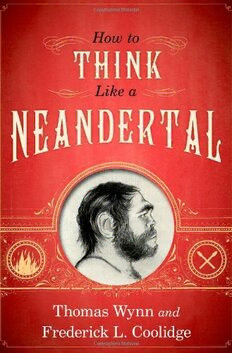Download How To Think Like a Neandertal PDF Free - Full Version
Download How To Think Like a Neandertal by Thomas Wynn, Frederick L. Coolidge in PDF format completely FREE. No registration required, no payment needed. Get instant access to this valuable resource on PDFdrive.to!
About How To Think Like a Neandertal
There have been many books, movies, and even TV commercials featuring Neandertals--some serious, some comical. But what was it really like to be a Neandertal? How were their lives similar to or different from ours? In How to Think Like a Neandertal, archaeologist Thomas Wynn and psychologist Frederick L. Coolidge team up to provide a brilliant account of the mental life of Neandertals, drawing on the most recent fossil and archaeological remains. Indeed, some Neandertal remains are not fossilized, allowing scientists to recover samples of their genes--one specimen had the gene for red hair and, more provocatively, all had a gene called FOXP2, which is thought to be related to speech. Given the differences between their faces and ours, their voices probably sounded a bit different, and the range of consonants and vowels they could generate might have been different. But they could talk, and they had a large (perhaps huge) vocabulary--words for places, routes, techniques, individuals, and emotions. Extensive archaeological remains of stone tools and living sites (and, yes, they did often live in caves) indicate that Neandertals relied on complex technical procedures and spent most of their lives in small family groups. The authors sift the evidence that Neandertals had a symbolic culture--looking at their treatment of corpses, the use of fire, and possible body coloring--and conclude that they probably did not have a sense of the supernatural. The book explores the brutal nature of their lives, especially in northwestern Europe, where men and women with spears hunted together for mammoths and wooly rhinoceroses. They were pain tolerant, very likely taciturn, and not easy to excite. Wynn and Coolidge offer here an eye-opening portrait of Neandertals, painting a remarkable picture of these long-vanished people and providing insight, as they go along, into our own minds and culture.
Detailed Information
| Author: | Thomas Wynn, Frederick L. Coolidge |
|---|---|
| Publication Year: | 2011 |
| ISBN: | 9780199742820 |
| Pages: | 223 |
| Language: | English |
| File Size: | 1.74 |
| Format: | |
| Price: | FREE |
Safe & Secure Download - No registration required
Why Choose PDFdrive for Your Free How To Think Like a Neandertal Download?
- 100% Free: No hidden fees or subscriptions required for one book every day.
- No Registration: Immediate access is available without creating accounts for one book every day.
- Safe and Secure: Clean downloads without malware or viruses
- Multiple Formats: PDF, MOBI, Mpub,... optimized for all devices
- Educational Resource: Supporting knowledge sharing and learning
Frequently Asked Questions
Is it really free to download How To Think Like a Neandertal PDF?
Yes, on https://PDFdrive.to you can download How To Think Like a Neandertal by Thomas Wynn, Frederick L. Coolidge completely free. We don't require any payment, subscription, or registration to access this PDF file. For 3 books every day.
How can I read How To Think Like a Neandertal on my mobile device?
After downloading How To Think Like a Neandertal PDF, you can open it with any PDF reader app on your phone or tablet. We recommend using Adobe Acrobat Reader, Apple Books, or Google Play Books for the best reading experience.
Is this the full version of How To Think Like a Neandertal?
Yes, this is the complete PDF version of How To Think Like a Neandertal by Thomas Wynn, Frederick L. Coolidge. You will be able to read the entire content as in the printed version without missing any pages.
Is it legal to download How To Think Like a Neandertal PDF for free?
https://PDFdrive.to provides links to free educational resources available online. We do not store any files on our servers. Please be aware of copyright laws in your country before downloading.
The materials shared are intended for research, educational, and personal use in accordance with fair use principles.

